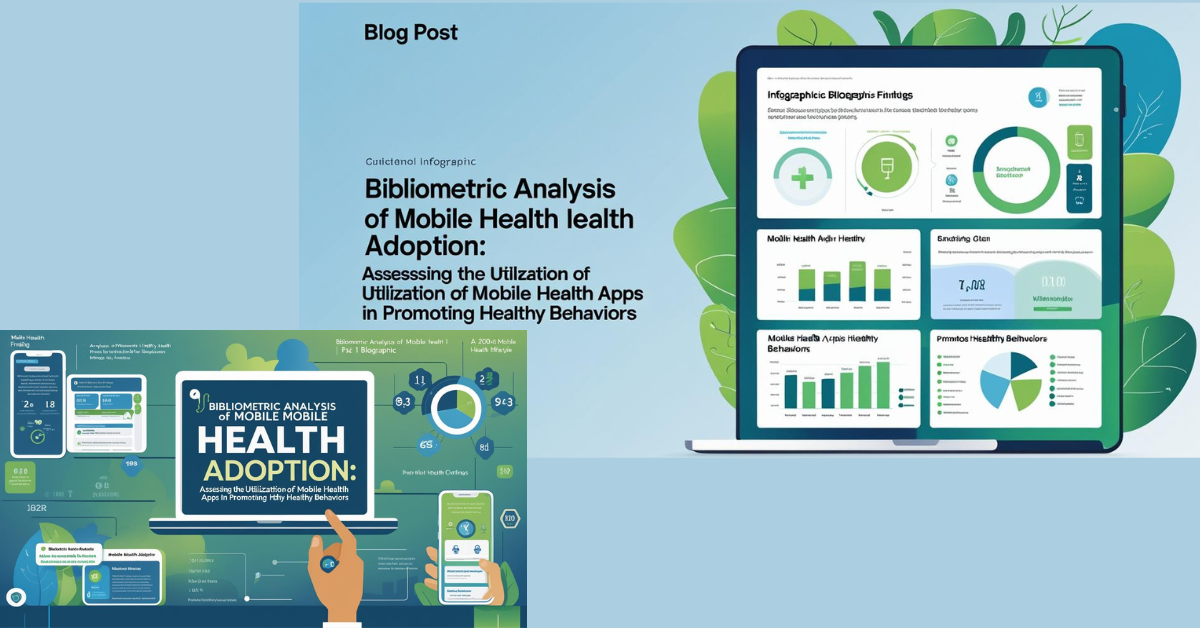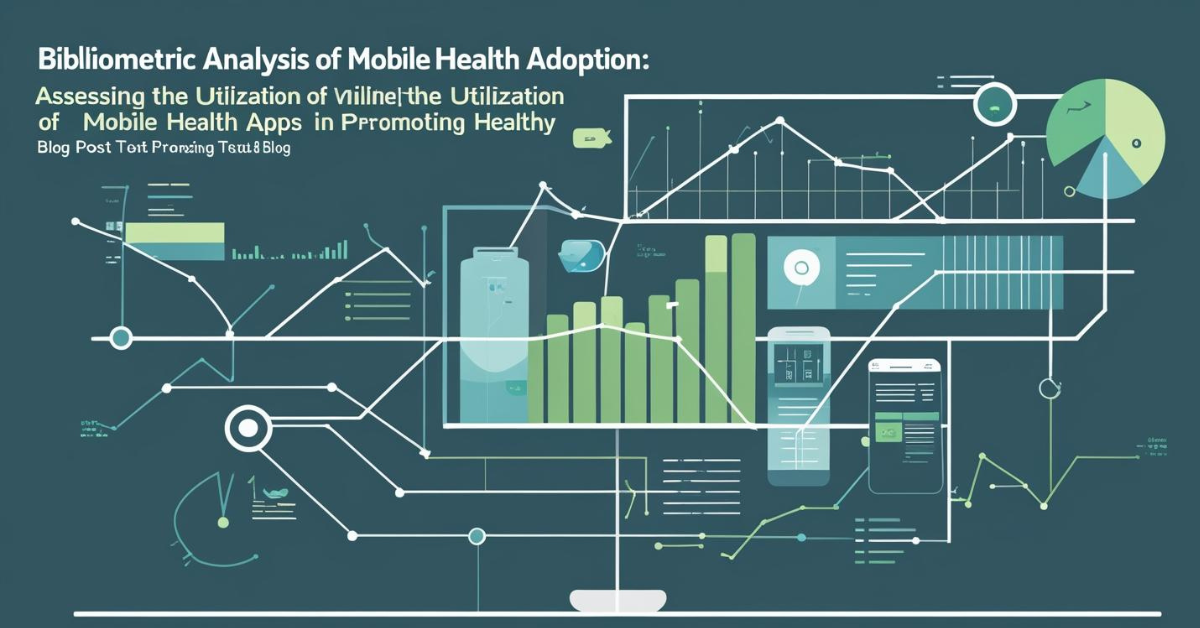A Bibliometric Analysis of Mobile Health Adoption: Assessing the Utilization of Mobile Health Apps in Promoting Healthy Behaviors. The use of mobile health applications has increased in recent years and has had a significant impact on healthcare by promoting healthy behaviors.
Bibliometric Analysis of Mobile Health Adoption: Assessing the Utilization of Mobile Health Apps in Promoting Healthy Behaviors
Executive Summary
This Bibliometric analysis explores the research outlook of mobile health (mHealth) applications and their efficacy in recommend healthy behaviors. The study analyzes publication current, research networks, and central evolution in the field from 2005 to 2024, with individual focus on behavior replace interventions.
Introduction
Background
Mobile health (mHealth) represents a promptly grow domain within digital health, abusing smartphones and mobile applications to deliver health interventions, monitor patient behaviors, and stimulate wellness. The widespread approval of mobile devices has created unusual opportunities for health behavior modification at scale.
Research Objectives
- Analyze publication trends and growth patterns in mHealth research
- Identify key research themes and evolution in healthy behavior promotion
- Map collaboration networks and influential authors/institutions
- Assess the effectiveness of mHealth apps in behavior change interventions
- Examine methodological approaches and research gaps
Significance
Understanding the research landscape helps identify evidence-based approaches for mHealth app development and implementation, informing both researchers and practitioners in the field.
Methodology
Data Sources
- Primary Databases: Web of Science, Scopus, PubMed
- Search Period: 2005-2024
- Language: English publications only
- Document Types: Original research articles, reviews, conference papers
Search Strategy
Primary Keywords:
- “mobile health” OR “mHealth” OR “m-health”
- “mobile application*” OR “mobile app*” OR “smartphone app*”
- “health behavior*” OR “behavior change” OR “healthy lifestyle”
- “physical activity” OR “diet” OR “nutrition” OR “exercise”
Inclusion Criteria
- Studies focusing on mobile health applications
- Research examining behavior change interventions
- Publications addressing healthy lifestyle promotion
- Clinical trials, systematic reviews, and observational studies
Exclusion Criteria
- Non-English publications
- Conference abstracts without full papers
- Studies not specifically addressing behavior change
- Purely technical/software development papers without health outcomes
Bibliometric Analysis Tools
- VOSviewer: Network visualization and clustering
- CiteSpace: Temporal analysis and burst detection
- Bibliometrix (R): Comprehensive bibliometric analysis
- Gephi: Advanced network analysis
Key Findings from Current Literature
Publication Trends
Based on recent bibliometric studies, several key trends emerge:
- Exponential Growth: Research publications increased rapidly from 2011, with over 6,000 mHealth-related papers published between 2005-2024
- Recent Saturation: Publication growth has plateaued since 2021, suggesting field maturation
- Research Volume: Studies have identified thousands of mobile health app publications, with extensive citation networks
Major Research Themes
Behavior Change Interventions
- Physical activity promotion and monitoring
- Dietary behavior modification and nutrition tracking
- Weight management and obesity prevention
- Chronic disease self-management
- Mental health and wellness applications
Technology Integration
- Wearable device connectivity
- Artificial intelligence and machine learning
- Gamification and user engagement
- Social networking features
- Real-time feedback mechanisms
Clinical Applications
- Diabetes management
- Cardiovascular health monitoring
- Mental health support (PTSD, depression, anxiety)
- Substance abuse intervention
- Preventive care and health promotion
Effectiveness Evidence
Research indicates mixed results regarding mHealth app effectiveness:
Positive Outcomes
- User perception of effectiveness in diet and physical activity apps
- Improved health consciousness and self-education
- Enhanced social support and community engagement
- Increased self-monitoring behaviors
Limitations and Challenges
- Limited strong evidence for significant behavioral changes
- High attrition rates and low long-term engagement
- Inconsistent implementation of behavior change techniques
- Lack of theoretical framework integration
Research Methodology Framework
Quantitative Analysis
- Publication Volume: Annual publication counts and growth rates
- Citation Analysis: Most cited papers and citation networks
- Author Productivity: H-index, publication counts, collaboration patterns
- Journal Impact: Source publications and impact factors
- Institutional Analysis: Leading research institutions and countries
Qualitative Analysis
- Thematic Evolution: Keyword co-occurrence and trend analysis
- Research Gaps: Underexplored areas and future opportunities
- Methodological Assessment: Study designs and outcome measures
- Theoretical Frameworks: Behavior change theories and models
Network Analysis
- Co-authorship Networks: Collaboration patterns and research clusters
- Co-citation Analysis: Knowledge base and influential works
- Keyword Networks: Conceptual relationships and emerging themes
- Institutional Collaboration: International and interdisciplinary partnerships
Expected Results and Analysis Framework
Temporal Analysis
- Blooming phase in mHealth research (2005-2011, 2011-2021, 2021-2024)
- Emerging research hotspots and diminish themes
- COVID-19 impact on mHealth research acceleration
Thematic Clusters
- Cluster 1: Physical Activity and Fitness Apps
- Cluster 2: Nutrition and Diet Management
- Cluster 3: Chronic Disease Management
- Cluster 4: Mental Health Applications
- Cluster 5: Technology and User Experience
Geographic and Institutional Distribution
- Leading countries in mHealth research
- Top contributing institutions and research centers
- International collaboration patterns
- Funding sources and research support
Behavior Change Effectiveness Analysis
Theoretical Frameworks
- Social Cognitive Theory applications
- Transtheoretical Model implementation
- Health Belief Model integration
- Self-Determination Theory in app design
Behavior Change Techniques (BCTs) of Effectiveness Analysis
- Goal setting and planning
- Feedback and monitoring
- Social support mechanisms
- Rewards and incentives
- Education and information provision
Outcome Measures
- Primary Outcomes: Behavior change indicators
- Secondary Outcomes: Health status improvements
- Process Outcomes: App usage and engagement metrics
- Long-term Outcomes: Sustained behavior maintenance
Research Gaps and Future Directions
Methodological Improvements
- Standardized outcome measurements
- Longer follow-up periods
- Randomized controlled trial designs
- Multi-center collaborative studies
Technology Advancement
- Artificial intelligence integration
- Personalization algorithms
- Interoperability standards
- Privacy and security enhancements
Population-Specific Research
- Age-specific interventions
- Cultural adaptation studies
- Socioeconomic accessibility
- Special population needs
Implications and Recommendations
For Researchers
- Focus on rigorous study designs with adequate sample sizes
- Implement theoretical frameworks in intervention development
- Conduct longer-term follow-up studies
- Explore combination interventions and multi-modal approaches
For Practitioners
- Evidence-based app selection and recommendation
- Integration with clinical practice workflows
- Patient education and support strategies
- Monitoring and evaluation protocols
For App Developers
- Incorporate proven behavior change techniques
- Design for long-term engagement and retention
- Ensure accessibility and usability across populations
- Implement robust data privacy and security measures
Limitations and Considerations
Database Limitations
- Potential bias toward English-language publications
- Varying indexing practices across databases
- Grey literature exclusion
Methodological Considerations
- Rapid field evolution affecting analysis currency
- Heterogeneity in study designs and outcomes
- Publication bias toward positive results
Conclusion
The Bibliometric analysis imparts a mature but evolving field with significant research scheme in mHealth applications for behavior change. While the evidence base is considerable, there remains a need for more precise research designs and longer-term outcome studies. The field shows promise for continued growth; particularly in individualize interventions and AI-driven approaches.
Future research should focus on addressing identified gaps, improving methodological exactness, and developing more effective, theoretically-grounded interventions that can perform help behavior change and improved health outcomes.
References Framework
Note: This framework should be populated with actual citations from the comprehensive literature search. Key reference categories should include:
- Foundational mHealth Reviews (2015-2020)
- Recent Bibliometric Studies (2020-2024)
- Behavior Change Theory Papers
- Clinical Effectiveness Studies
- Technology and User Experience Research
- Methodological and Review Papers
Estimated reference count: 150-200 publications
Read More:
https://nurseseducator.com/didactic-and-dialectic-teaching-rationale-for-team-based-learning/
https://nurseseducator.com/high-fidelity-simulation-use-in-nursing-education/
First NCLEX Exam Center In Pakistan From Lahore (Mall of Lahore) to the Global Nursing
Categories of Journals: W, X, Y and Z Category Journal In Nursing Education
AI in Healthcare Content Creation: A Double-Edged Sword and Scary
Social Links:
https://www.facebook.com/nurseseducator/
https://www.instagram.com/nurseseducator/
https://www.pinterest.com/NursesEducator/
https://www.linkedin.com/in/nurseseducator/
https://www.researchgate.net/profile/Afza-Lal-Din
https://scholar.google.com/citations?hl=en&user=F0XY9vQAAAAJ

